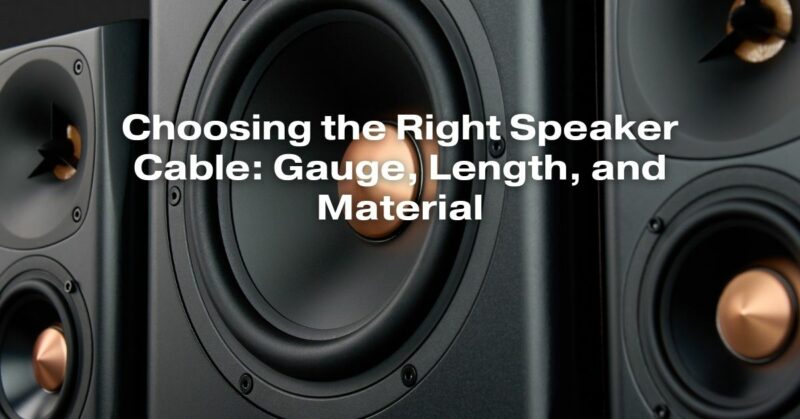Speaker cable is an essential component of any audio system, but it’s often overlooked. The right speaker cable can make a big difference in the sound quality of your music, so it’s important to choose the right one for your needs.
What is Speaker Cable?
Speaker cable is simply a type of wire that connects your amplifier or receiver to your speakers. It carries the audio signal from your amplifier to your speakers, where it is converted into sound waves.
Speaker Cable Gauge
Speaker cable gauge refers to the thickness of the wire. The lower the gauge number, the thicker the wire. Thicker wires have less resistance, which means they can transfer more power to your speakers.
The most common speaker cable gauges are 12AWG, 14AWG, 16AWG, and 18AWG. For most home audio systems, 16AWG wire is sufficient. However, if you have high-end speakers or long speaker wire runs, you may want to use a thicker gauge wire.
Speaker Cable Length
The length of your speaker cable also affects its performance. Longer cables have more resistance, which can reduce the amount of power that reaches your speakers.
If you have long speaker wire runs, you may want to use a thicker gauge wire to compensate for the increased resistance. You can also use a speaker wire calculator to determine the best gauge wire for your needs.
Speaker Cable Material
Speaker cable is typically made from copper or aluminum. Copper is the better conductor, but it’s also more expensive. Aluminum is a less expensive conductor, but it’s not as good as copper.
For most home audio systems, copper speaker cable is the best choice. However, if you’re on a budget, aluminum speaker cable can be a good option.
Choosing the Right Speaker Cable
When choosing speaker cable, it’s important to consider the following factors:
Speaker impedance: The impedance of your speakers is measured in ohms. Higher impedance speakers require thicker gauge wire.
Speaker wire length: Longer speaker wire runs require thicker gauge wire.
Budget: Copper speaker cable is more expensive than aluminum speaker cable.
Conclusion
Choosing the right speaker cable can make a big difference in the sound quality of your music. By considering the factors above, you can choose the right speaker cable for your needs.
Here are some additional tips for choosing and using speaker cable:
Avoid using speaker cable that is too thin. Thin wire can cause signal loss and reduce the sound quality of your music.
If you have long speaker wire runs, use a thicker gauge wire or a speaker wire amplifier.
Use high-quality connectors to attach your speaker cable to your amplifier and speakers.
Avoid running speaker cable near power cords or other sources of electrical interference.
By following these tips, you can ensure that you’re getting the most out of your speaker cable and your audio system.


